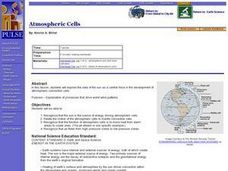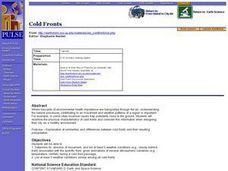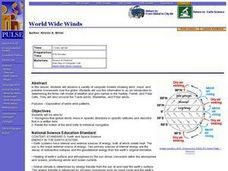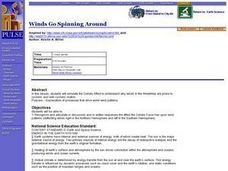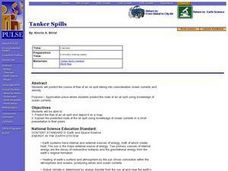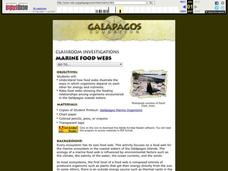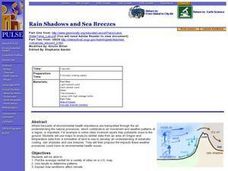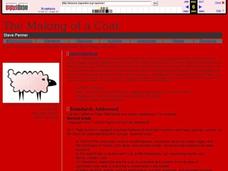Curated OER
The Blizzard of 1993
Students read and interpret the information from a barograph from a major winter storm. This task assesses students' abilities to interpret and analyze graphs, construct data tables and graphs, generalize, infer, apply knowledge of...
Curated OER
Formation of Wind
Students correctly sequence the steps leading to the formation of wind, and describe the cause and effect relationships involved in the formation of wind. This task assesses students' abilities to classify, generalize, infer, interpret...
Curated OER
Acid Rain
Young scholars use real-time weather maps to determine the likelihood of acid rainfall in a region. Students apply their understanding of interaction between weather systems, land and air pollution, to address acid rain and the effects...
Curated OER
Atmospheric Cells
Pupils recognize that the sun is the source of energy driving atmosphere cells. They relate the motion of the atmospheric cells to mantle convection cells. Students recognize that the function of atmospheric cells is to move heat from...
Curated OER
Cold Fronts
Young scholars determine its' direction of movement, and list at least five weather conditions associated with the specific front, given animations of several atmospheric variables during a cold front passage. They list at least three...
Curated OER
World Wide Winds
Students recognize that global winds move in specific directions in specific latitudes and describe that in a written form. They relate the motion of the wind belts to historical navigation.
Curated OER
Winds Go Spinning Around
Students simulate the Coriolis Effect to comprehend why winds in the Westerlies are prone to cyclonic and anti-cyclonic motion. They arrive at an explanation of processes that drive world wind patterns
Curated OER
Tanker Spills
Young scholars predict the flow of an oil spill and depict it on a map. They explain the predicted route of the oil spill using knowledge of ocean currents in a short presentation to their peers.
Curated OER
It's Gettin' Hot In Here, So Transfer Energy
Students study the means by which energy is transferred from the sun through the Earth's atmosphere. They examine radiation, conduction, and convection. They complete a lab to determine how the different transfers affect the atmosphere...
Curated OER
Marine Food Webs
Students examine how food webs illustrate the ways in which organisms depend on each other for energy and nutrients, and make food webs showing the feeding relationships among organisms encountered in the Gal??pagos coastal waters.
Curated OER
Acid and Rain and Its Effects
Students work in groups for up to three weeks to investigate the possibility of acid rain in your area and to investigate the damage that acid rain can do to buildings, monuments, and plants. Each group prepares a report to local...
Curated OER
Rain Shadows and Sea Breezes
Students plot the average rainfall for a variety of cities in the United States. Using the map, they work together to determine patterns on which toxicants are transported through the air. They determine the impacts of various weather...
Curated OER
Give me Food!
Students study the food guide pyramid and use it to create their own eating program.In this health lesson students visit websites to calculate their BMR, activity level and weight then create a nutrition plan
Curated OER
Biomes -- Part 1
Students use the internet to locate and gather information on the world's biomes. They compare and contrast biomes to ecosystems and describe the human effects on ecosystems. They answer questions to end the lesson.
Curated OER
Chemistry And The Nitrogen Cycle
Learners investigate the factors that compose the nitrogen cycle. The harmful effects of acid rain and ozone depletion are also discussed in the lesson. Students define the nutrient that is often limiting to plant growth through...
Curated OER
The Intertidal Zone
Students research the diverse animal and plant life that inhabit the intertidal zones along the Pacific rocky coast. As students progress through this lesson, they begin to recognize distinct behaviors, adaptations, and characteristics...
Curated OER
Science: What Is the Carbon Cycle?
Students examine the carbon cycle while identifying its sources, sinks, and release agents. Using magazines and newspapers, groups of students design collages illustrating the carbon cycle. Finally, they write responses to several...
Curated OER
Corridor of Time Fieldtrip Worksheet and Explorers Heritage Center History Hunt
In this Corridor of Time and Explorers Heritage Center worksheet, students respond to 29 short answer and fill in the blank questions regarding information presented in the North Dakota Heritage Center.
Curated OER
In the Eye of the Storms
Tenth graders study the major hurricanes of the Atlantic Ocean. In this weather lesson, 10th graders read an article and answer various questions. Students discuss their findings with their classmates.
Curated OER
Earth's Land and Water
Students describe physical characteristics of bodies of water and landforms. In this land and water lesson plan, students model land and water with modeling clay and also discuss why people live near bodies of water.
Curated OER
The Making of a Coat
Young scholars read the story A New Coat For Anna and discuss their knowledge on how to make a coat. In this reading and coat making lesson plan, students discuss coat making and listen to a speaker that spins thread to make coats.
Curated OER
Understanding a Geological Map
Students identify different types of maps and observe a geological map. In this geology lesson students create a replica map of a geological area that includes a key.
Curated OER
Should We Hunt the Largest Animals on the Planet?
Students discover details about whaling. In this environmental stewardship instructional activity, students research selected websites to locate information about commercial whaling and its implications.
Curated OER
What's Holding Up the Water?
Students read about the history and locate dams in Arizona. In this Arizona dams lesson plan, students write a summary about what they read focusing on word choice, ideas, conventions, and geography content.





